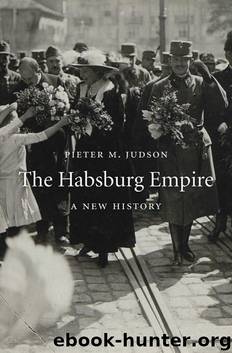The Habsburg Empire: A New History by Pieter M. Judson

Author:Pieter M. Judson [Judson, Pieter M.]
Language: eng
Format: epub
ISBN: 9780674047761
Publisher: Harvard University Press
Published: 2016-04-25T05:00:00+00:00
Workers required education to become economical and thrifty and to value advance planning. The liberal education program would create a Volk of sober householders who knew the value of work and the value of money—eventually.
Negative attitudes toward questions of women’s enfranchisement among liberal politicians in both Austria and Hungary reinforce this picture of a surprisingly narrow social formation with very little sense of its own political vulnerability. Educated and property-owning women, after all, could arguably have served as effective political allies to their men, and their numbers were increasing rapidly during this period throughout the monarchy. The possible programmatic enfranchisement of educated middle-class women, however, does not seem to have occurred to anyone before the end of the century. It was certainly not a main goal of the regional bourgeois women’s movements that developed during the liberal period (1860–1890) in several parts of the monarchy, from Lower Austria and Bohemia to Hungary and Galicia.45 These, including Vienna’s General Austrian Women’s Society [Allgemeiner österreichischer Frauenverein] founded in Vienna in 1893 and led by teacher Auguste Fickert, focused their energies on issues of employment, education, professionalization, pension coverage, and reform of marriage law.46 Not until after 1900 was the issue of women’s suffrage more seriously debated as newer mass parties, from the Austrian and Hungarian Social Democrats to the Czech National Socialists and even some activists in the Christian Social movement began to treat women’s suffrage as a possible means to expand their voting bases.
During the 1880s some of the liberal-dominated diets even closed existing loopholes that since 1848 had unintentionally allowed some privileged women in their capacities as business- or landowners to vote in communal or diet elections—albeit through male proxies.47 Arguing in 1889 that respectable women should be protected from election sites where they would “be exposed to the ‘influence terrorism’ of our increasingly hard fought elections,” Lower Austrian deputy Joseph Kopp—one of Austria’s most progressive liberals on other issues—labeled the idea of women’s suffrage “completely abnormal.”48 The diets in Carniola and Carinthia abolished women’s right to vote in 1884; Styria did so in 1904, and Istria in 1908.49
In the very same decade when deputies like Kopp intentionally closed off privileged women’s remaining opportunities to vote, they were more than happy to encourage their wives and sisters to work for nationalist causes. Since nationalist organizations in Imperial Austria were legally categorized as nonpolitical associations, women were allowed to join their growing networks in the 1880s as active participants and even to found their own branches. The work accomplished by these women was in fact highly political in several ways, as a glance at the texts of the many speeches they gave in these associations amply demonstrates. Moreover, women played hugely influential roles in raising money for nationalist causes by organizing festivals, selling consumer goods whose purchase benefitted nationalist associations, and doing much of the hard work to mobilize their neighbors for various causes. In ideological terms, however, all of these forms of women’s mobilization for nationalist causes could be justified as cultural work that befitted their gender.
Download
This site does not store any files on its server. We only index and link to content provided by other sites. Please contact the content providers to delete copyright contents if any and email us, we'll remove relevant links or contents immediately.
| Africa | Americas |
| Arctic & Antarctica | Asia |
| Australia & Oceania | Europe |
| Middle East | Russia |
| United States | World |
| Ancient Civilizations | Military |
| Historical Study & Educational Resources |
Room 212 by Kate Stewart(4988)
The Crown by Robert Lacey(4703)
Endurance: Shackleton's Incredible Voyage by Alfred Lansing(4648)
The Iron Duke by The Iron Duke(4265)
The Rape of Nanking by Iris Chang(4117)
Joan of Arc by Mary Gordon(3997)
Killing England by Bill O'Reilly(3936)
Say Nothing by Patrick Radden Keefe(3863)
I'll Give You the Sun by Jandy Nelson(3338)
Shadow of Night by Deborah Harkness(3272)
Hitler's Monsters by Eric Kurlander(3252)
Mary, Queen of Scots, and the Murder of Lord Darnley by Alison Weir(3128)
Blood and Sand by Alex Von Tunzelmann(3112)
Darkest Hour by Anthony McCarten(3052)
Eleanor & Park by Rainbow Rowell(3024)
Margaret Thatcher: The Autobiography by Thatcher Margaret(3016)
Red Famine: Stalin's War on Ukraine by Anne Applebaum(2854)
Book of Life by Deborah Harkness(2847)
The One Memory of Flora Banks by Emily Barr(2767)
